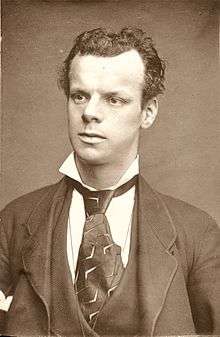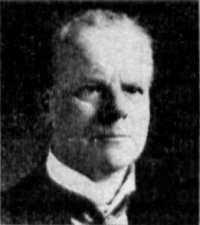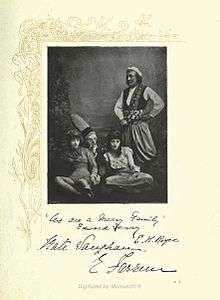Edward O'Connor Terry
Edward O'Connor Terry (10 March 1844 – 2 April 1912) was an English actor, who became one of the most influential actors and comedians of the Victorian era.

Life and career
Terry was born in London, allegedly the illegitimate son of Feargus O'Connor, Irish Chartist leader and advocate of the land plan. The younger Terry made his debut in 1863 as Wormwood in The Lottery Ticket. He began his stage career in small companies in the provinces playing in Shakespeare with the young Henry Irving and sometimes in pieces employing his singing talents.[1]

In 1867, Terry played for a season at London's Surrey Theatre in both comedy and drama. Between 1868 and 1875, he was the leading comedian at the Royal Strand Theatre in London. He reached the peak of his popularity after he joined John Hollingshead's company at the Gaiety Theatre, London in 1876, starring in the musical burlesques produced there during the next eight years.[1] With Nellie Farren, Kate Vaughan and E. W. Royce, he made the fortune of this house, his eccentric acting and singing creating a style which had many imitators.[2] Some of the roles in which he appeared there included Mephistopheles in Little Doctor Faust (1878).

In 1887 he went into management, opening Terry's Theatre,[2] built on the site of the old Coal Hole public house and music hall on the Strand. There, he produced and starred as Dick Phenyl in Arthur Wing Pinero's Sweet Lavender, which was perhaps his greatest success, running for 670 nights. He then revived Pinero's The Magistrate and The Times. In subsequent years, he was only occasionally seen at his own theatre and made many tours in the British provinces and in Australia, North and South America, South Africa and India.[2] He returned to Terry's in 1890, producing and starring in King Kodak, The Blue Boar and several other notable productions. Terry brought four plays to New York in 1904. In this, his only Broadway engagement, he and his touring company played the former Princess Theatre on West 29th St. for eight weeks from December 1904 to February 1905, in The House of Burnside, Sweet Lavender, Love in Idleness, and The Passport.[3]
Terry married twice; his first marriage was to Ellen Seitz in 1870. He married his second wife, Lady Florence Harris, widow of Augustus Harris, in 1904.[4] Off the stage, he was a Freemason and served on the councils of many charities and of public bodies.[1][2]
Terry died of neuritis at his home in Barnes, England, at the age of 68.[1]
Notes
- "Edward Terry Dead; Noted English Actor; Comedian, with Career of 49 Years". The New York Times, 3 April 1912, p. 13
- Chisholm 1911.
- Mantle and Sherwood, p. 480
- Taylor, C. M. P. "Terry, Edward O'Connor (1844–1912), actor and theatre proprietor", Oxford Dictionary of National Biography, Oxford University Press, 2004. Retrieved 12 May 2020 (subscription or UK public library membership required)
References
- Hollingshead, John. Gaiety Chronicles (1898) A. Constable & co.: London
- Hollingshead, John. Good Old Gaiety: An Historiette & Remembrance (1903) London:Gaity Theatre Co
- Mantle, Burns and Garrison P. Sherwood, eds., The Best Plays of 1899-1909, (Philadelphia: The Blakiston Company), 1944.

External links
| Wikimedia Commons has media related to Edward O´Connor Terry. |